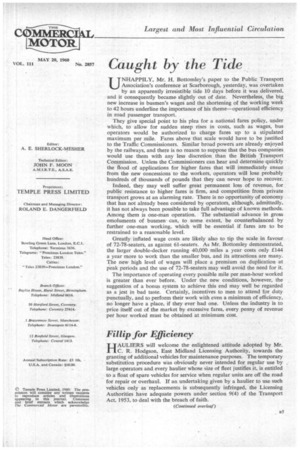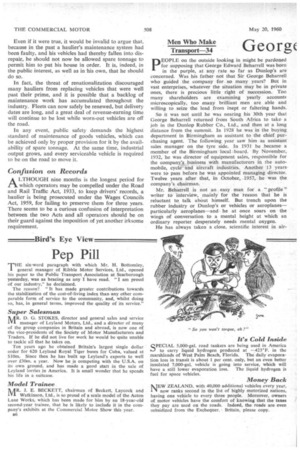Caught by the Tide
Page 39

Page 40

If you've noticed an error in this article please click here to report it so we can fix it.
UNHAPPILY, Mr. H. Bottomley's paper to the Public Transport Association's conference at Scarborough, yesterday, was overtaken by an apparently irresistible tide 10 days before it was delivered, and it consequently became, slightly out of date. Nevertheless, the big new increase in busmen's wages and the shortening of the working week to 42 hours underline the importance of his theme—operational efficiency in road passenger transport.
They give special point to his plea for a national fares policy, under which, to allow for sudden steep rises in costs, such as wages, bus operators would be authorized to charge fares up to a stipulated maximum per mile. Fares above that scale would have to be justified to the Traffic Commissioners. Similar broad powers are already enjoyed by the railways, and there is no reason to suppose that the bus companies would use them with any less discretion than the British Transport Commission. Unless the Commissioners can hear and determine quickly ' the flood of applications for higher fares that will immediately ensue from the new concessions to the workers, operators will lose probably hundreds of thousands of pounds that they can never hope to recover.
Indeed, they may well suffer great permanent loss of revenue, for public resistance to higher fares is firm, and competition from private transport grows at an alarming rate. There is no opportunity of economy that has not already been considered by operators, although, admittedly, it has not always been possible to take full advantage of known methods. Among them is one-man operation. The substantial advance in gross emoluments of busmen can, to some extent, be counterbalanced by further one-man working, which will be essential if fares are to be restrained to a reasonable level.
Greatly inflated wage costs are likely also to tip the scale in favour of 72-78-seaters, as against 61-seaters. As Mr. Bottomley demonstrated, the larger double-decker running 40,000 miles a year costs only £144 a year more to work than the smaller bus, and its attractions are many. The new high level of wages will place a premium on duplication • at peak periods and the use of 72-78-seaters may well avoid the need for it The importance of operating every possible mile per man-hour worked is greater than ever before. Under the new conditions, however, the suggestion of a bonus system to achieve this end may well be regarded as a jest in bad taste. Certainly, incentives to men to attend for duty punctually, and to perform their work with even a minimum of efficiency, no longer have a place, if they ever had one. Unless the industry is to price itself out of the market by excessive fares, every penny of revenue per hour worked must be obtained at minimum cost.
Fillip for Efficiency
HAULIERS will welcome the enlightened attitude adopted by Mr. C. R. Hodgson, East Midland Licensing Authority, towards the granting of additional vehicles for maintenance purposes. The temporary substitution procedure was obviously never intended for regular use by large operators and every haulier whose size of fleet justifies it, is entitled to a float of spare vehicles for service when regular units are off the road for repair or overhaul. If an undertaking given by a haulier to use such vehicles only as replacements is subsequently infringed, the Licensing Authorities have adequate powers under section 9(4) of the Transport Act, 1953, to deal with the breach of faith. Even if it were true, it would be invalid to argue that, because in the past a haulier's maintenance system had been faulty, and his vehicles had thereby fallen into disrepair, he should not now be allowed spare tonnage to permit him to put his house in order. It is, indeed, in the public interest, as well as in his own, that he should do so.
In fact, the threat of renationalization discouraged many hauliers from replacing vehicles that were well past their prime, and it is possible that a backlog of maintenance work has accumulated throughout the industry. Fleets can now safely be renewed, but delivery dates are long, and a great deal of revenue-earning time will continue to be lost while worn-out vehicles are off the road.
In any event, public safety demands the highest standard of maintenance of goods vehicles, which can be achieved only by proper provision for it by the availability of spare tonnage. At the same time, industrial output grows, and every serviceable vehicle is required to be on the road to move it.
Confusion on Records
ALTHOUGH nine months is the longest period for which operators may be compelled under the Road and Rail Traffic Act, 1933, to keep drivers' records, a haulier is being prosecuted under the Wages Councils Act, 1959, for failing to preserve them for three years. There seems to be a curious confusion of interpretation between the two Acts and all operators should be on their guard against the imposition of yet another irksome requirement.




















































































































